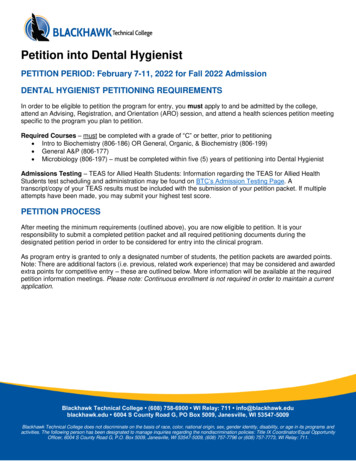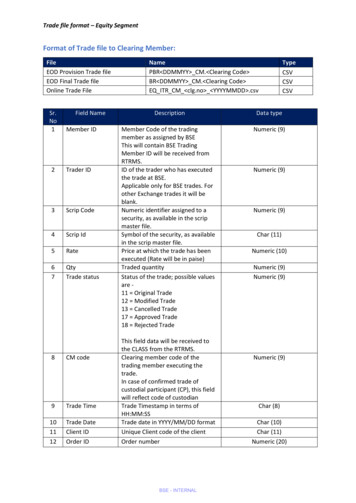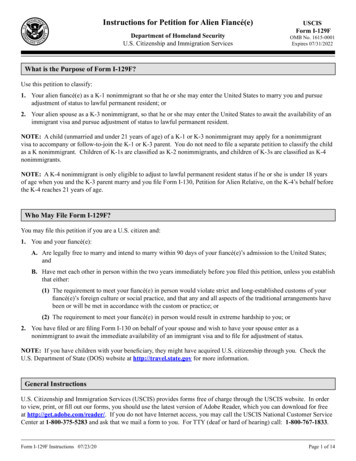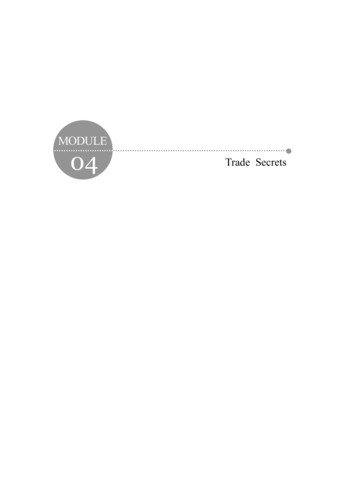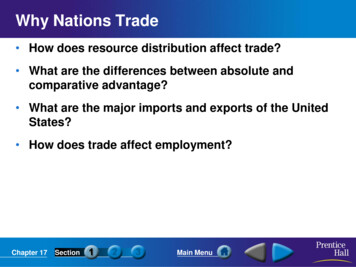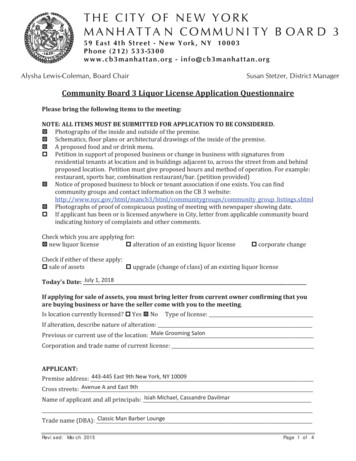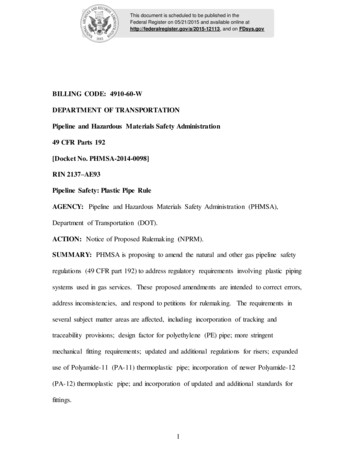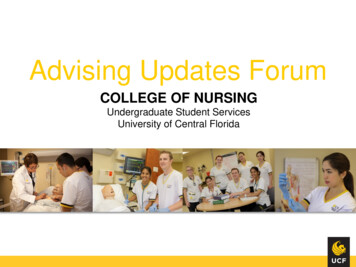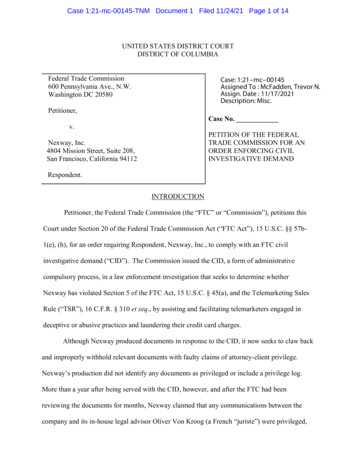
Transcription
Case 1:21-mc-00145-TNM Document 1 Filed 11/24/21 Page 1 of 14UNITED STATES DISTRICT COURTDISTRICT OF COLUMBIAFederal Trade Commission600 Pennsylvania Ave., N.W.Washington DC 20580Case: 1:21 mc 00145Assigned To : McFadden, Trevor N.Assign. Date : 11/17/2021Description: Misc.Petitioner,Case No.v.PETITION OF THE FEDERALTRADE COMMISSION FOR ANORDER ENFORCING CIVILINVESTIGATIVE DEMANDNexway, Inc.4804 Mission Street, Suite 208,San Francisco, California 94112Respondent.INTRODUCTIONPetitioner, the Federal Trade Commission (the “FTC” or “Commission”), petitions thisCourt under Section 20 of the Federal Trade Commission Act (“FTC Act”), 15 U.S.C. §§ 57b1(e), (h), for an order requiring Respondent, Nexway, Inc., to comply with an FTC civilinvestigative demand (“CID”). The Commission issued the CID, a form of administrativecompulsory process, in a law enforcement investigation that seeks to determine whetherNexway has violated Section 5 of the FTC Act, 15 U.S.C. § 45(a), and the Telemarketing SalesRule (“TSR”), 16 C.F.R. § 310 et seq., by assisting and facilitating telemarketers engaged indeceptive or abusive practices and laundering their credit card charges.Although Nexway produced documents in response to the CID, it now seeks to claw backand improperly withhold relevant documents with faulty claims of attorney-client privilege.Nexway’s production did not identify any documents as privileged or include a privilege log.More than a year after being served with the CID, however, and after the FTC had beenreviewing the documents for months, Nexway claimed that any communications between thecompany and its in-house legal advisor Oliver Von Kroog (a French “juriste”) were privileged,
Case 1:21-mc-00145-TNM Document 1 Filed 11/24/21 Page 2 of 14had been inadvertently produced, and should be returned. However, Nexway refused tospecifically identify the supposedly privileged documents or to provide a privilege log asrequired by the CID. While doubting the validity of the privilege claim (among other reasons,Mr. Von Kroog is not an attorney and has never been a member of a bar in the U.S. or France),the FTC searched for and proactively sequestered approximately 200 documents that, as best asit can determine given Nexway’s vague references, are allegedly privileged communications.Nexway’s vague, blanket privilege claim along with its refusal to identify the specificdocuments it considers privileged and produce a privilege log are hindering an ongoing federalinvestigation. Under this cloud of uncertainty, the FTC cannot use approximately 200documents that are relevant to its investigation, and it faces a risk that Nexway may seek to claimprivilege as to documents not presently segregated. Nexway’s improper actions not only violatethe CID but also run counter to legal standards for attorney-client privilege, which squarely placethe burden of protecting the privilege and proving the claim on Nexway.A summary proceeding to enforce the CID is necessary so that FTC staff may completeits investigation unobstructed by groundless privilege claims. The Court should issue an Orderdirecting Nexway to show cause why the Court should not rule that: Nexway has waived anyright to claim the attorney-client privilege related to any communications with or documentsprovided to Mr. Von Kroog produced to the FTC in response to the CID, or in the alternative;and, waiver aside, no attorney-client privilege applies to Nexway’s communications with juristeOliver Von Kroog; and therefore there is no restriction of the FTC using documents produced byNexway in response to the CID. The Commission has made no prior application to any court forsimilar relief.2
Case 1:21-mc-00145-TNM Document 1 Filed 11/24/21 Page 3 of 14The FTC submits the following declarations and exhibits, which verify the allegationsof the Petition and the accompanying memorandum of points and authorities: Exhibit 1: Declaration of Reeve Tyndall, Investigator at the FTC (“Tyndall Decl.”) Exhibit 2: Declaration of J. Ronald Brooke, Jr., Attorney at the FTC (“Brooke Decl.”) Exhibit 3: Declaration and Expert Report of Alexander Blumrosen, expert on Frenchlaw (“Blumrosen Report.”) Exhibit 4: Declaration of Gerwyn Baldwin (“Baldwin Decl.”) Exhibits 10-23: Exhibits to Declaration of Reeve Tyndall, Investigator at the FTC Exhibits 24-34: Exhibits to Expert Report of J. Ronald Brooke, Jr. Attorney at the FTCPETITION ALLEGATIONSIn support of its Petition, the Commission alleges as follows:The Parties1. The Commission is an administrative agency of the United States government, organizedand existing pursuant to the FTC Act, 15 U.S.C. § 41, et seq. The Commission isauthorized and directed by Section 5(a) of the FTC Act, 15 U.S.C. § 45(a), to prohibit,inter alia, “unfair or deceptive acts or practices in or affecting commerce.” TheCommission is also authorized by the Telemarketing and Consumer Fraud and AbusePrevention Act, 15 U.S.C. §§ 6101-6108, and the rules promulgated under the authorityof that Act, the Telemarketing Sales Rule, 16 C.F.R. Part 310, to prevent deceptive orabusive telemarketing acts or practices.2. Respondent Nexway, Inc. is a Delaware corporation, which resides in, is found andtransacts business in Washington, DC. Tyndall Decl. ¶¶ 8, 143
Case 1:21-mc-00145-TNM Document 1 Filed 11/24/21 Page 4 of 14Jurisdiction and Venue3. Section 3 of the FTC Act, 15 U.S.C. § 43, empowers the Commission to prosecute anyinquiry necessary to its duties in any part of the United States; Section 6 of the Act, 15U.S.C. § 46, empowers the Commission to investigate the business and conduct of anyperson, partnership, or corporation engaged in or whose business affects commerce;Section 20 of the FTC Act, 15 U.S.C. § 57b-1, empowers the Commission to require byCID the provision of oral testimony, documents, or other information relating to anyCommission law enforcement investigation.4. The Court has jurisdiction to enforce the Commission’s duly issued CIDs, including theCID issued to Nexway. Sections 20(e) and (h) of the FTC Act, 15 U.S.C. §§57b-1(e) and(h), respectively, authorize the Commission to seek district court orders to enforce itsCIDs in any jurisdiction in which the recipient of a CID “resides, is found, or transactsbusiness” and district courts to enter such orders. Nexway resides, is found, and transactsbusiness in the District of Columbia. Tyndall Decl. ¶¶ 8, 14. The Court also hasjurisdiction pursuant to 28 U.S.C. §§ 1331, 1337 and 1345.5. Venue is proper in the District of Columbia. The current investigation by theCommission is nationwide in scope, but is being directed and carried on within thisjudicial district at the FTC’s headquarters in Washington, DC. Tyndall Decl. ¶ 4. Venueis proper in the District of Columbia, which is the location of the investigating office.NLRB v. Cooper Tire & Rubber Co., 438 F.3d 1198, 1202 (D.C. Cir. 2006) (holding thatlocation of investigating office “may well be the most reasonable [venue] choice for4
Case 1:21-mc-00145-TNM Document 1 Filed 11/24/21 Page 5 of 14purposes of subpoena enforcement”); United States Intern. Trade Comm’n v. ASAT, Inc.,411 F.3d 245, 249 (D.C. Cir. 2005). Venue is also proper under 28 U.S.C. § 1391.The Commission’s Investigation6. The Commission is investigating Nexway and others for violations of Section 5 of theFTC Act, 15 USC §45(a), and the Telemarketing Sales Rule (“TSR”), 16 C.F.R. § 310 etseq., including assisting and facilitating unlawful practices and credit card laundering.Tyndall Decl. ¶¶ 15- 17. As part of this investigation, on January 28, 2020, theCommission issued a CID to Nexway. Tyndall Decl. ¶ 15. The CID was issuedpursuant to Commission Resolution No. 012 3145, which authorizes the use ofcompulsory process under Section 20 of the FTC Act, 15 U.S.C. §57b-1.7.The investigation was described as follows:Whether you or other persons or entities have engaged in deceptive and unfair practices inviolation of the FTC Act, 15 USC§ 45 by cred it card laundering, assisting or facilitatingviolations of the Telemarketing Sales Rule, 16 C.F.R. Part 310, or by making a false ormisleading statement to induce any person to pay for goods or services and whetherCommission action to obtain monetary relief would be in the public interest.Tyndall Dec. ¶ 15.8.The FTC served the CID on Nexway on February 3, 2020. Tyndall Decl. ¶ 20.9. The CID required Nexway to answer interrogatories and produce document relevant tothe investigation, including document requests that are relevant for determiningNexway’s and its officers’ knowledge of telemarketers’ deceptive practices. TyndallDecl. ¶ 15.10. The CID stated that a log should be provided when making privilege assertions. TyndallDecl. ¶ 19.5
Case 1:21-mc-00145-TNM Document 1 Filed 11/24/21 Page 6 of 1411. The CID also stated that failure to make privilege claims may result in a waiver of theprivilege. Specifically, the CID included the following instruction:Withholding Requested Material/ Privilege Claims: For specificationsrequesting production of Documents, if You withhold from production any materialresponsive to this CID based on a claim of privilege, work product protection,statutory exemption, or any similar claim, You must assert the claim no later thanthe return date of this CID, and You must submit a detailed log, in a searchableelectronic format, of the items withheld that identifies the basis for withholding thematerial and meets all the requirements set forth in 16 C.F.R. § 2.1l(a)-(c). Theinformation in the log must be of sufficient detail to enable FTC staff to assess thevalidity of the claim for each Document, including attachments, without disclosingthe protected information. If only some portion of any responsive material isprivileged, You must submit all non-privileged portions of the material. Otherwise,produce all responsive information and material without redaction. 16 C.F .R. §2.11(c). The failure to provide information sufficient to support a claim of protectedstatus may result in denial of the claim. 16 C.F.R. § 2.11(a)(l).Tyndall Decl. ¶ 19.12. Commission Rule 2.11, 16 C.F.R. § 2.11, requires CID respondents to provide tencategories of information when asserting a privilege claim, including the following: thefactual basis supporting the claim that the material is protected (for example, that it wasprepared by an attorney rendering legal advice to a client in a confidentialcommunication, or prepared by an attorney in anticipation of litigation regarding aspecifically identified claim) and any other pertinent information necessary to support theassertion of protected status by operation of law.13. The Commission’s Rules of Practice permit a CID recipient to raise legal or otherobjections to a CID by filing an administrative petition to limit or quash. 16 C.F.R. §2.10. Nexway did not file a petition to quash or limit the CID. Tyndall Decl. ¶ 23.14. Nexway, through counsel—Howard Fischer of Moses & Singer LLP—requested anextension on production, which the Commission granted. Nexway subsequently6
Case 1:21-mc-00145-TNM Document 1 Filed 11/24/21 Page 7 of 14produced documents on a rolling basis, in March, May and June 2020. Tyndall Decl. ¶21.15. Nexway’s production was made in an electronic format designed to be easily loaded intoan eDiscovery tool like Relativity. Indeed, Nexway’s production was likely producedusing such a tool. eDiscovery tools like Relativity are commonly used by thegovernment and law firms to review large numbers of documents, and include search andtagging functions. eDiscovery tools, like Relativity, include functions that allow a user tomake numerous targeted searches over thousands of documents. Baldwin Decl. ¶¶ 4-5.16. Nexway produced approximately 8210 documents (this includes emails, attachments,contracts, and spreadsheets). Nexway did not provide a privilege log with itsproductions, or otherwise identify any privileged documents it had withheld. It merelyincluded boiler-plate language in its cover letters reserving the right to claim privilegeand to claw back any inadvertently produced documents. Baldwin Decl. ¶ 6; TyndallDecl. ¶ 24.17. For more than seven months, the FTC searched and reviewed the documents produced byNexway. The FTC also used documents produced by Nexway in investigatory hearings,which involve showing documents to and asking questions of a witness during the courseof an investigation, all of which are recorded by a court reporter. The FTC conducted itssearch and review, and investigational hearings, prior to Nexway identifying even asingle specific document as privileged. Brooke Decl. ¶ 31.18. The FTC served Nexway with two notices informing the company that (1) the FTCwould be publicly disclosing documents that Nexway produced to witnesses ininvestigational hearings and others, and (2) Nexway could seek a protective order, if7
Case 1:21-mc-00145-TNM Document 1 Filed 11/24/21 Page 8 of 14necessary. The first letter, sent on June 18, 2020, informed Nexway that it had “the rightto seek a protective order that would prohibit the Commission from publicly disclosingthe submitted information” and requested that Nexway notify the FTC if Nexwayintended to seek a protective order. Nexway responded that it would not seek aprotective order provided that the information used by the FTC was not “inadvertentlyproduced attorney-client privileged documents” or “sensitive economic data.” However,Nexway failed to identify any particular documents as inadvertently produced and did notseek a protective order. Brooke Decl. ¶¶. 7-11.19. Subsequently, on December 17, 2020, the FTC sent Nexway a letter asking questionsabout a small group of financial documents, including document bates numbered 7247(“7247”), a spreadsheet that included information about invoices. Brooke Decl. ¶ 14.20. On January 4, 2021, the Commission sent Nexway another letter notifying Nexway that,pursuant to 16 C.F.R. § 4.10(g), the FTC was providing Nexway with notice that thedocuments produced in response to the CID issued to Nexway “may be publiclydisclosed.” The letter informed Nexway that it had “the right to seek a protective orderthat would prohibit the Commission from publicly disclosing the submitted information,”and requested that Nexway identify the FTC if it intended to seek a protective order.Again, Nexway did not seek a protective order. Brooke Decl. ¶¶ 11-13.21. Nexway’s counsel scheduled a call with FTC counsel in response to the January 4 letter.During the call, FTC counsel confirmed that the FTC planned to use documents producedby Nexway in an investigational hearing. Nexway counsel stated that they were going tospeak with their client and “will advise if we anticipate seeking any protective order.”Nexway did not seek a protective order. Brooke Decl. ¶¶ 12-138
Case 1:21-mc-00145-TNM Document 1 Filed 11/24/21 Page 9 of 14Nexway’s Belated Privilege Claim, Refusal to Specifically Identify Privileged Documents, andNoncompliance with the CID’s Requirement of a Privilege Log22. On March 5, 2021, Nexway sent the FTC a letter, which responded to a number of thequestions in the December 17, 2020 letter and, for the first time, claimed that onedocument – 7247 – was covered by the attorney-client privilege. Before this, Nexwayhad never claimed that any document was privileged. In particular, counsel for Nexwaysaid that 7247 was protected by attorney-client privilege because it was provided toOliver Von Kroog, Nexway/asknet counsel, to obtain legal advice. Nexway counselclaimed that 7247 had been inadvertently produced and requested that the FTC return thedocument and purge it from FTC document retention systems. Brooke Decl. ¶¶ 15-16.23. On March 9, 2021, the FTC responded via letter requesting that Nexway provide theCommission with the information required by the CID to support a privilege claim for7247. Brooke Decl. ¶ 18.24. On April 19, 2021, Nexway sent a letter in response to the FTC’s March 9, 2021 letter:(1) again claiming that 7247 was privileged; and (2) further requesting that the FTCreturn documentation between Nexway and Oliver Von Kroog that was inadvertentlyproduced. Nexway’s April 19, 2021 response did not (1) identify any other documentbesides 7247 or (2) include a privilege log. Brooke Decl. ¶¶ 19-20.25. The FTC responded to Nexway by letter on April 27, 2021 (“April 27 letter”). In theApril 27 letter, the FTC noted that Nexway’s April 19, 2021 request concerningcorrespondence with Mr. Von Kroog was vague and overbroad, and failed to identifywhich documents Nexway claimed were privileged and why. Specifically, the April 27letter noted that Nexway had “not identified any documents as being inadvertently9
Case 1:21-mc-00145-TNM Document 1 Filed 11/24/21 Page 10 of 14produced” and that Nexway’s reference to hypothetically privileged documents did notsuffice as identification. Brooke Decl. ¶ 21.26. Furthermore, the April 27 letter pointed out that “neither your correspondence nor ourinquiry” established or provided any evidence that Oliver Von Kroog is a member of abar – a requirement for any attorney-client privilege claim to apply to any documents sentto him. The April 27 letter noted that (1) the FTC could find no evidence that Mr. VonKroog was a licensed attorney in the U.S.; (2) on his public LinkedIn page, Mr. VonKroog identified himself as a “Legal Advisor/Juriste” and in-house employee of Nexway;and (3) in France, a juriste is not a member of a bar. Therefore, the April 27 letterconcluded that the attorney-client privilege would not apply to communications with Mr.Von Kroog under both U.S. and French law, citing to case law showing that the attorneyclient privilege did not apply to communications with someone unless they were amember of the bar. Additionally, the April 27 letter noted that Nexway had failed to (1)produce a privilege log and (2) comply with the instructions set forth in the CID relatedto withholding a document on the basis of privilege. Brooke Decl. ¶¶ 22-24.27. The FTC also informed Nexway that, while the status of 7247 was in dispute, the FTCwould sequester the document as permitted by 16 C.F.R. § 2.11(d)(1)(ii)(B). BrookeDecl. ¶ 24.28. The FTC concluded the April 27 letter by (1) noting that it was Nexway’s burden tosearch for and identify documents for which it claimed privilege; and (2) requesting thatNexway fully comply with the CID instruction and produce a log and identify whichprivileged documents it claimed to have inadvertently produced within 14 days. If10
Case 1:21-mc-00145-TNM Document 1 Filed 11/24/21 Page 11 of 14Nexway did not do so, the April 27 letter stated, the FTC would assume that noprivileged documents were inadvertently produced. Brooke Decl. ¶ 25.29. On May 4, 2021, FTC staff and Nexway counsel had a conference call. During that call,FTC staff indicated that they were in the process of preparing a draft of a proposedComplaint that relied on numerous documents produced by Nexway. FTC staffrequested that Nexway identify any documents to which they would claim privilege sothat the FTC could finalize a proposed Complaint. Instead, Nexway counsel suggestedthat (1) the FTC provide Nexway with a list of documents FTC staff intended to rely onso that Nexway could identify which documents Nexway now claimed to be privileged;or (2) FTC staff provide Nexway with a copy of the draft proposed Complaint so thatNexway could identify which sections relied on documents Nexway now claimed to beprivileged. FTC staff rejected these proposals and that same day sent a follow up emailreiterating the requests in the April 27 letter that Nexway: (1) comply with therequirements of the CID; (2) identify any documents Nexway claimed were privileged;(3) prove that Mr. Von Kroog is a member of the bar; and (4) establish all of the elementsof the attorney-client privilege claim for any document within 14 days of April 27, 2021.Brooke Decl. ¶¶ 26-28.30. On May 11, 2021, Nexway’s counsel sent an email in which Nexway (1) did not includeany evidence that Mr. Von Kroog was a member of a bar, (2) refused to search andidentify any documents it claimed were privilege, and (3) refused to produce a privilegelog. Brooke Decl. ¶¶ 29-30.31. Nexway has not claimed that Mr. Von Kroog is a member of a bar in either the UnitedStates or France. Brooke Decl. ¶ 30.11
Case 1:21-mc-00145-TNM Document 1 Filed 11/24/21 Page 12 of 1432. Mr. Von Kroog is not an attorney and is not a member of a bar in the U.S. or France.Instead, Mr. Von Kroog is a French juriste; an in-house legal advisor who has studied lawat a university, but has not gone to law school, passed a bar, or been admitted to a bar.Tyndall Decl. ¶¶ 25-28; Blumrosen Report. ¶¶ 21-22, 27-31, 38-39, 65.33. Communications with a juriste or in-house counsel are not privileged under French law.Blumrosen Report. ¶¶ 40, 42.34. Nexway did not take reasonable steps to prevent any inadvertent disclosure and has nottaken reasonable steps to rectify any inadvertent disclosure. Nexway has repeatedlyrefused to review its production for potentially privileged documents and produce aprivilege log specifically identifying the documents it claims are privileged and wereinadvertently disclosed.Sequestration of Documents35. FTC staff searched for and identified approximately 200 documents produced by Nexwaythat included Mr. Von Kroog’s email address or were attached to documents with hisemail address. Even though Nexway failed to identify any purportedly privilegeddocuments besides 7247, the FTC, out of an abundance of caution, proactivelysequestered the approximately 200 documents identified by its search that, as best as itcan determine given Nexway’s vague references, include communications Mr. VonKroog received or sent, and attachments to those communications. Baldwin Decl. ¶¶ 78.36. This sequestration is broader than would be required by any claim of attorney-clientprivilege offered by Nexway, since, for example, the search did not exclude documentsthat were shared with other companies. Brooke Decl. ¶ 35.12
Case 1:21-mc-00145-TNM Document 1 Filed 11/24/21 Page 13 of 1437. As of today, Nexway has still not identified any document other than 7247 as privileged,or produced a privilege log. Brooke Decl. ¶ 33.38. Nexway’s effort to withhold documents required by the CID based on its unsupportedprivilege claim has impeded the Commission’s ability to complete its investigation and iscontrary to the public interest. Brooke Decl. ¶ 36.Notice of Intent to Raise Issue of Foreign Law39. The FTC intends to raise the issue of privilege under French law, and any otherapplicable foreign law. Pursuant to Federal Rule of Civil Procedure 44.1, “A party whointends to raise an issue concerning the law of a foreign country shall give notice bypleadings or other writing. In determining foreign law, the court may consider anyrelevant material or source, including testimony, whether or not submitted by a party oradmissible under the Federal Rules of Evidence. The court’s determination must betreated as a ruling on a question of law.”PRAYER FOR RELIEFThe FTC invokes the aid of this Court and requests the following:1. The immediate issuance of an order directing Nexway to appear and show cause whythe Court should not rule that (a) any right Nexway had to assert a privilege related to anycommunications with or documents provided to Mr. Von Kroog it produced in response to theFTC’s CID has been waived; and (b) no attorney-client privilege applies to Nexway’scommunications with Mr. Von Kroog; or2. In the alternative, the immediate issuance of an order directing Nexway to appear andshow cause why the Court should not enter an order (a) requiring that Nexway produce to theFTC and to the Court a complete and thorough privilege log that complies with the CID and13
Case 1:21-mc-00145-TNM Document 1 Filed 11/24/21 Page 14 of 14FTC Rule 2.11; and (b) including an expedited briefing schedule regarding the validity of anyNexway privilege claims so that the FTC has an opportunity to challenge Nexway’s claims as awhole and on a document-by-document basis, with in camera review of the documents ifnecessary; and3.Such other relief as this Court deems just and proper.Dated: November 17, 2021Respectfully submitted,FEDERAL TRADE COMMISSIONJames Reilly DolanActing General CounselMichele AringtonAssistant General Counsel for Litigations/Russell DeitchRussell Deitch, AttorneyJ. Ronald Brooke, Jr., AttorneyFederal Trade CommissionWashington, DC 20580202-326-2585(Deitch)202-326-3484 (Brooke)rdeitch@ftc.govjbrooke@ftc.gov14
ORDER ENFORCING CIVIL INVESTIGATIVE DEMAND . INTRODUCTION . Petitioner, the Federal Trade Commission (the "FTC" or "Commission"), petitions this Court under Section 20 of the Federal Trade Commission Act ("FTC Act"), 15 U.S.C. §§ 57b- 1(e), (h), for an order requiring Respondent, Nexway, Inc., to comply with an FTC civil


